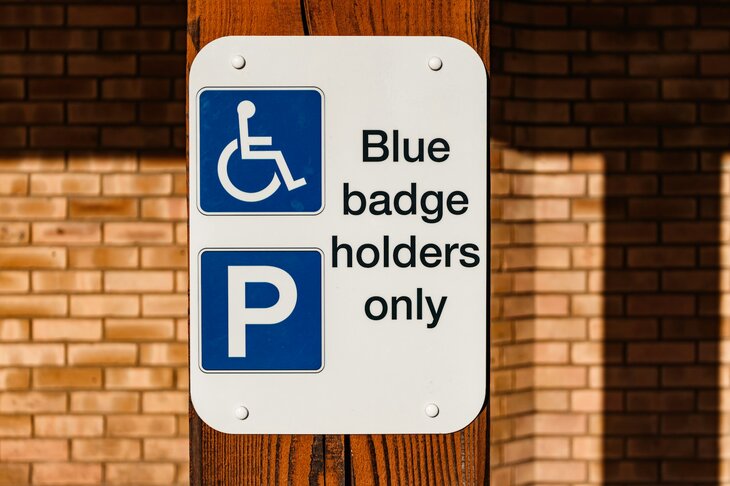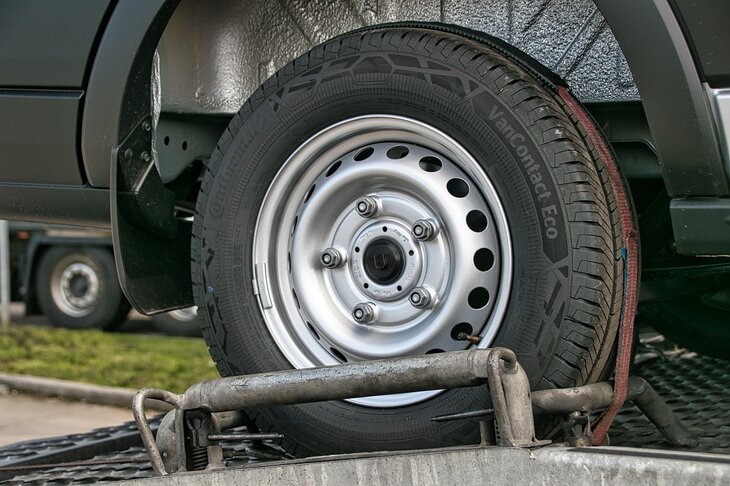Navigating the process of getting a handicap parking permit in Utah might seem difficult, but with the right guidance, it’s easier than you might think. Whether you’re applying for the first time, renewing your placard, or assisting a loved one, this comprehensive guide will walk you through every step.
How to Get a Handicap Parking Permit in Utah
Securing a handicap parking permit in Utah is simple if you know what to expect. The Utah Division of Motor Vehicles (DMV) is responsible for issuing these permits to qualifying individuals. Here’s how you can get started:
Step 1: Determine Your Eligibility
Before applying, it’s essential to determine if you meet Utah’s eligibility criteria for a handicap parking permit. Generally, you qualify if you have a disability that limits or impairs mobility.
Your healthcare provider has to certify your condition on the application form, so ensure that your diagnosis meets the state’s criteria.
Step 2: Complete the Utah Handicap Parking Permit Application
The next step is to fill out the official application form, known as Form TC-842, Disabled Person And Physician Disability Certification. This form is available online on the Utah DMV website or can be picked up at any DMV office.
The application has two main parts:
- Applicant Information: You’ll need to fill out your details, such as name, address, and driver’s license number.
- Medical Certification: This section must be completed by a licensed physician, nurse practitioner, or physician’s assistant. They’ll confirm your eligibility based on your medical condition.
Step 3: Submit Your Application
Once your application is complete, it’s time to submit it. You can either:
- Mail the application to the Utah DMV office.
- Visit a local DMV office and submit the form in person.
Processing times may vary, but you can expect your placard within a few weeks if all goes smoothly.
Eligibility for Disability Parking Permit in Utah
Knowing the eligibility requirements for a disability parking permit in Utah is key. The state has set clear guidelines to ensure that those who genuinely need special parking privileges receive them.
Key Eligibility Criteria
To qualify, you must have a physical or medical condition that significantly impairs your ability to walk or move without assistance. Some of the most common qualifying conditions include:
- Inability to walk 200 feet without stopping: This is one of the primary benchmarks used to assess mobility impairment.
- Dependence on assistive devices: If you require the use of a wheelchair, walker, crutches, or cane, you likely qualify.
- Lung disease: Conditions such as chronic obstructive pulmonary disease (COPD) that restrict airflow and affect breathing are considered.
- Cardiac conditions: Severe heart conditions, particularly those classified as Class III or IV, are included.
- Arthritis and neurological disorders: Severe cases that affect mobility are also eligible.
Special Cases
- Disabled Veterans: If you are a disabled veteran, you may qualify for additional benefits, including a specialized parking permit.
- Mental Disabilities: In some cases, mental disabilities that affect your ability to safely drive through parking and public spaces may also qualify you for a permit. Discuss these specific circumstances with your healthcare provider.
Utah Handicap Placard Renewal
A handicap placard in Utah is not a one-time issuance; it requires renewal periodically. The renewal process ensures that only those who still meet the eligibility criteria continue to benefit from disabled parking privileges.
Permanent Placards:
Normally, a permanent handicap placard in Utah is valid for up to two years. You must renew it by submitting a renewal application before it expires. Unlike the initial application, some renewals may not require new medical certification, especially if the condition is known to be permanent.
Temporary Placards:
Temporary permits are usually valid for up to six months. If you still need the permit after it expires, you must apply for a new one with updated medical certification.
To renew:
- Download the Renewal Form: Visit the Utah DMV website and download the renewal form.
- Complete the Form: Fill in the required details and, if necessary, have your healthcare provider certify your condition.
- Submit the Renewal: You can mail the form to the DMV or visit a local office to renew in person.
Keeping track of your placard’s expiration date is vital to avoid lapses in your disabled parking privileges.
Where to Apply for a Handicap Placard in Utah
Knowing where and how to apply for a handicap placard in Utah can save you time and stress. There are several convenient options available:
In-Person Application
For those who prefer face-to-face interaction, visiting a local DMV office is the best option. The staff can guide you through the process, answer any questions, and ensure your application is complete.
By Mail
If you prefer not to visit the DMV in person, you can mail your completed application form to the Utah DMV office. Be sure to include any necessary documentation and allow ample time for processing.
Handicap Parking Permit Requirements in Utah
Understanding the requirements for a handicap parking permit in Utah is crucial for a smooth application process. Let’s break down what you need to know.
Medical Certification
One of the most critical requirements is medical certification. A licensed healthcare provider must verify that you have a qualifying disability. This certification is valid for 30 days from the date of signing, so timely submission of your application is essential.
Documentation
When submitting your application, ensure that you include:
- The completed application form (Form TC-842).
- Proof of Utah residency, such as a utility bill or driver’s license.
- Any applicable fees (if required).
Failure to provide all necessary documentation may result in delays or denial of your application.
How Long Does It Take to Get a Handicap Placard in Utah?
Waiting for your handicap placard can be a bit stressful, especially if you need it to improve your daily mobility. The processing time can vary, but here’s what you can expect:
Standard Processing Time
Once your application is submitted, it usually takes a few weeks for the DMV to process and mail your handicap placard. However, this timeframe can fluctuate depending on the volume of applications the DMV is handling.
Expedited Processing
If you’re in urgent need of a handicap placard, visiting a local DMV office in person might speed up the process. While there is no official “expedited” service, explaining your situation to the staff may result in faster processing.
Tips to Avoid Delays:
- Ensure your application is complete: Double-check that all required fields are filled out and that your medical certification is valid.
- Submit your application in person: This can sometimes lead to quicker processing compared to mailing it in.
Temporary Handicap Permit Utah
Sometimes, disabilities are temporary, and Utah offers temporary handicap permits for such cases. Whether you’re recovering from surgery, an injury, or a short-term medical condition, a temporary permit can help make your recovery more comfortable.
Applying for a Temporary Permit
The application process for a temporary handicap permit in Utah is similar to that for a permanent one. You’ll need:
- Form TC-842: The same form used for permanent placards. Your healthcare provider must certify your temporary condition.
- Temporary Permit Section: Ensure the healthcare provider specifies that the condition is temporary and provides an estimated recovery time.
Temporary permits are usually valid for up to six months. If you need the permit for a longer period, a new application and certification will be required.
Renewal and Expiration
Temporary permits cannot be renewed. If your condition persists beyond the expiration date, you must reapply with updated medical certification. Be mindful of the expiration date to avoid penalties for using an expired permit.
Utah Disabled Parking Permit Laws
Utah has clear laws governing the use and issuance of disabled parking permits to confirm that they are used correctly and fairly. Knowing these laws can help you avoid penalties and ensure you’re making the most of your permit.
Proper Use of the Permit
- Display Requirements: The placard must be visible, either hanging from the rearview mirror or placed on the dashboard.
- Personal Use: The placard is assigned to the person with the disability, not the vehicle. It’s illegal to use the placard if the permit holder is not in the vehicle.
- Parking Restrictions: Only park in designated handicap spaces. Misuse of the placard in non-designated areas can lead to fines.
Utah Handicap Placard Replacement
Losing or damaging your handicap placard can be a hassle, but the Utah DMV makes the replacement process a cakewalk.
Steps to Replace a Lost or Damaged Placard
- 1. Report the Loss: If your placard is lost or stolen, it’s advisable to report it to the local authorities, though this is not mandatory.
- 2. Complete a Replacement Form: Fill out the necessary replacement application, available on the Utah DMV website.
- 3. Submit the Form: You can submit the form by mail or in person at a DMV office. In some cases, a small fee may be required for the replacement.
Make sure you keep your replacement placard safe and always have it on hand when parking in designated spaces.
How Much Does a Handicap Placard Cost in Utah?
The cost of a handicap placard in Utah is one of the more common questions applicants have. Fortunately, the state keeps this aspect of the process easy and affordable.
Cost Breakdown
- Permanent Placards: Issued free of charge.
- Temporary Placards: Issued free of charge, but a new application is required for renewal.
- Replacement Placards: A small fee may apply, depending on the circumstances.
The low cost of obtaining a handicap placard in Utah makes it accessible to everyone who needs it, ensuring that financial constraints don’t prevent anyone from receiving this vital assistance.
Utah Disabled Veteran Parking Permit
Veterans who have sustained disabilities as a result of their service may be eligible for special consideration when applying for a parking permit.
Eligibility for Disabled Veterans
To qualify for a disabled veteran parking permit in Utah, you must:
- Have a service-connected disability.
- Provide documentation from the Department of Veterans Affairs (VA) verifying your condition.
Benefits for Disabled Veterans
In addition to the standard handicap parking permit, disabled veterans may also qualify for additional benefits, including fee exemptions and special plates. Contact the Utah DMV for more detailed information tailored to veterans.
Utah Handicap Permit for Out-of-State Residents
If you’re visiting Utah and have a disability parking permit from another state, you may wonder if it’s valid in Utah.
Validity of Out-of-State Permits
Utah honors handicap permits issued by other states. If you’re visiting and have a valid permit from your home state, you can use it in Utah without any additional paperwork.
Long-Term Stays
If you plan to stay in Utah for an extended period, it might be worth applying for a temporary permit within the state, especially if your home state’s permit is due to expire.
Penalties for Misuse of Handicap Placard in Utah
Misusing a handicap placard is a serious offense in Utah. Understanding the potential penalties can help you avoid costly mistakes.
Types of Misuse
- Using the placard without the permit holder present: This is one of the most common violations.
- Altering or forging a placard: This includes modifying an expiration date or duplicating a placard.
- Using an expired placard: Be mindful of the expiration date to avoid this common mistake.
Consequences
- Fines: Misuse can result in fines of $250 or more.
- Placard Revocation: Serious violations can lead to the revocation of your handicap permit.
- Legal Action: In extreme cases, you may face criminal charges for fraud or forgery.
By following the rules and using your placard responsibly, you can avoid these penalties and continue to enjoy the benefits it provides.
Getting a Handicap Permit in Utah: Final Notes
In conclusion, obtaining and using a handicap permit in Utah involves several steps, from determining your eligibility to grasping the legal requirements. By following this guide, you can navigate the process with ease and ensure that you have the access and convenience you need.
Whether you’re applying for the first time, renewing, or replacing a lost placard, identifying the ins and outs of the process is key to ensuring your rights and privileges are protected. If you have any doubts or need help getting or renewing your handicap permit in Utah, we’ve got you covered!
Featured image by Kace Lott on Unsplash





